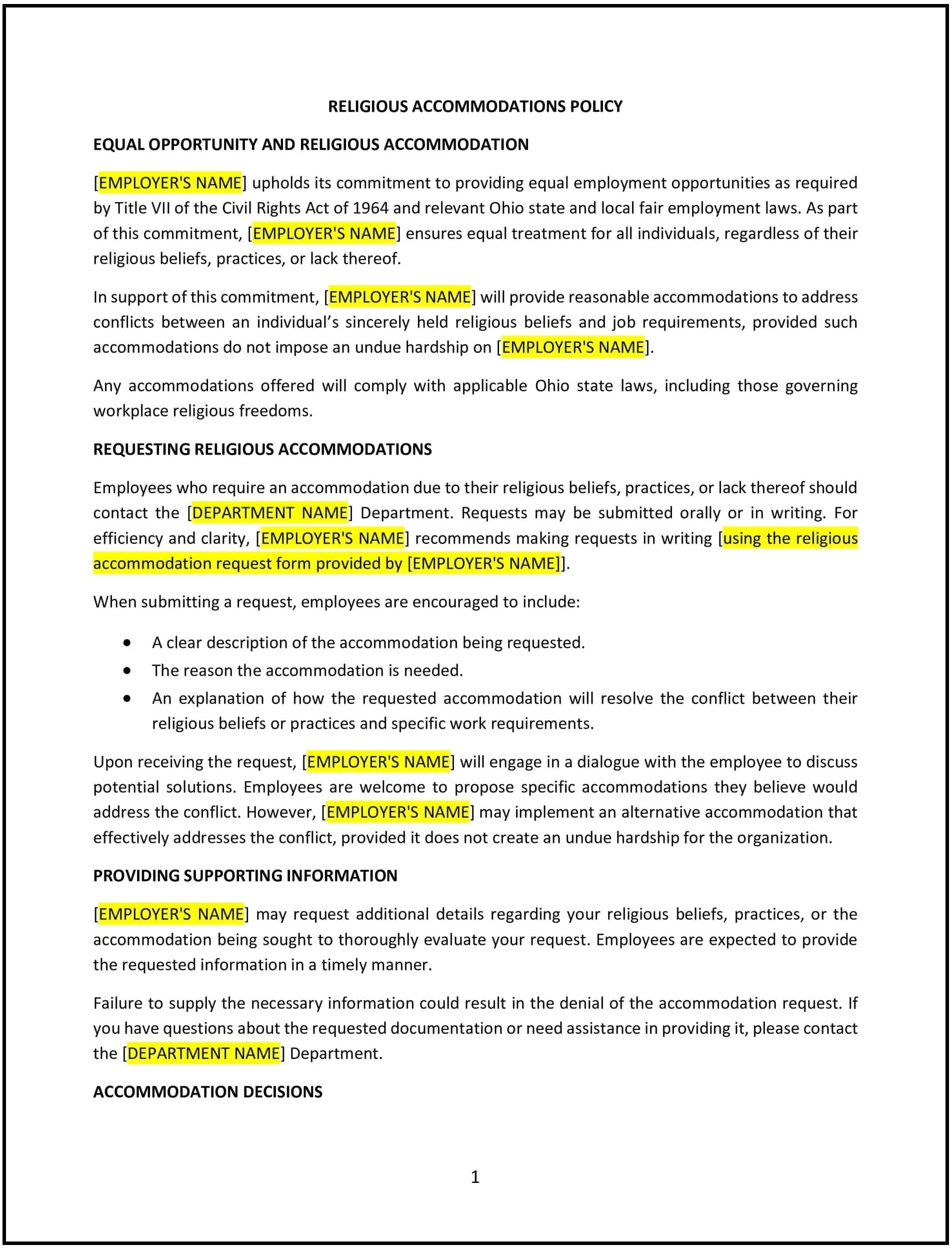Religious accommodations policy (Ohio): Free template
Got contracts to review? While you're here for policies, let Cobrief make contract review effortless—start your free review now.

Customize this template for free
Religious accommodations policy (Ohio)
A religious accommodations policy provides Ohio businesses with guidelines for addressing employees’ requests for accommodations related to their religious beliefs or practices. This policy outlines the process for requesting accommodations, defines the types of accommodations that may be provided, and specifies how the business will address such requests in a manner that respects both the employee's rights and the operational needs of the business.
By implementing this policy, Ohio businesses can ensure they meet legal requirements while fostering a diverse and inclusive work environment where employees feel supported in practicing their faith.
How to use this religious accommodations policy (Ohio)
- Define religious accommodations: The policy should clearly define what constitutes religious accommodation, such as changes to work schedules, dress codes, or job duties that allow employees to observe religious practices, including prayer times, holidays, or dietary restrictions.
- Establish the request process: The policy should outline how employees can request religious accommodations, including any forms, documentation, or specific timelines required for submitting their requests. It should also specify who employees should contact within the business to make these requests.
- Assess the accommodation request: The policy should explain how accommodation requests will be assessed on a case-by-case basis, considering factors such as the employee's specific religious needs, the feasibility of the accommodation, and its impact on the workplace or business operations.
- Set clear guidelines for reasonable accommodations: The policy should clarify that the business will provide reasonable accommodations unless doing so would impose undue hardship on the business, such as significant disruption to operations or an increase in costs.
- Address undue hardship: The policy should explain the concept of "undue hardship," including examples of circumstances where accommodating a religious request may not be possible due to significant operational or financial impacts on the business.
- Ensure confidentiality: The policy should outline how employee religious information will be handled confidentially, in accordance with privacy laws and regulations.
- Encourage open communication: The policy should emphasize the importance of open communication between employees and managers when it comes to religious accommodation requests. The goal should be to find mutually beneficial solutions while respecting both the employee’s rights and the business’s needs.
- Review and update regularly: The policy should be reviewed periodically to ensure it remains aligned with Ohio state laws, federal regulations, and the evolving needs of the business.
Benefits of using this religious accommodations policy (Ohio)
This policy provides several key benefits for Ohio businesses:
- Fosters a diverse and inclusive work environment: By accommodating religious practices, businesses demonstrate their commitment to diversity and inclusivity, which helps create a supportive workplace culture.
- Reduces legal risk: Implementing a clear religious accommodations policy helps businesses comply with Ohio state laws and federal regulations, such as Title VII of the Civil Rights Act, reducing the risk of discrimination claims or lawsuits.
- Enhances employee satisfaction and retention: Providing religious accommodations shows that the business values its employees’ personal beliefs, leading to increased job satisfaction and a greater sense of respect and loyalty.
- Promotes workplace harmony: By allowing employees to observe their religious practices, the policy helps prevent conflicts or misunderstandings that could arise from scheduling or cultural differences.
- Improves business reputation: Businesses that provide religious accommodations are viewed as ethical and socially responsible, which can enhance their reputation with employees, customers, and the community.
- Ensures fairness: The policy ensures that all employees are treated fairly, with their religious needs being respected and considered equally, regardless of their faith or background.
- Supports retention of a diverse workforce: Accommodating religious practices helps businesses retain employees from a variety of religious backgrounds, contributing to a more diverse and engaged workforce.
Tips for using this religious accommodations policy (Ohio)
- Communicate the policy clearly: Ensure that all employees are aware of the religious accommodations policy by including it in the employee handbook, reviewing it during onboarding, and providing periodic reminders of the process for making accommodation requests.
- Encourage an open dialogue: Foster an environment where employees feel comfortable discussing their religious accommodation needs with their manager or HR without fear of discrimination or retaliation.
- Train management and HR staff: Train managers and HR staff to handle accommodation requests with sensitivity, ensuring they understand how to assess requests fairly and legally.
- Document accommodation requests: Keep detailed records of all religious accommodation requests and the corresponding actions taken, including the date, type of accommodation, and any challenges or solutions.
- Regularly assess impact: Periodically review the accommodations provided to ensure that they are meeting both employee needs and business requirements without creating undue hardship.
- Stay informed of legal changes: Keep up-to-date with changes in Ohio state laws and federal regulations related to religious accommodations to ensure that the policy remains legally compliant and effective.